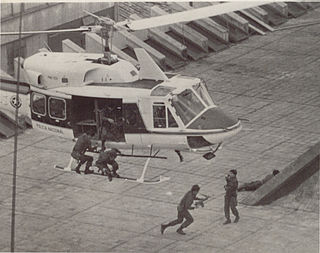
The history of Panama includes the history of the Isthmus of Panama prior to European colonization.

Darién is a province in Panama whose capital city is La Palma. With an area of 11,896.5 km2 (4,593.3 sq mi), it is located at the eastern end of the country and bordered to the north by the province of Panamá and the region of Kuna Yala. To the south, it is bordered by the Pacific Ocean and Colombia. To the east, it borders Colombia; to the west, it borders the Pacific Ocean and the province of Panama.

Andrés Pastrana Arango is a Colombian politician who was the 30th President of Colombia from 1998 to 2002, following in the footsteps of his father, Misael Pastrana Borrero, who was president from 1970 to 1974.

Cinema of Colombia refers to film productions made in Colombia, or considered Colombian for other reasons. Colombian cinema, like any national cinema, is a historical process with industrial and artistic aspects.

The Administrative Department of Security was the security service agency of Colombia, which was also responsible for border and immigration services. It was dissolved on 31 October 2011 as part of a wider Executive Reform, and was replaced by the Dirección Nacional de Inteligencia (DNI).

The Palace of Justice siege was a 1985 attack on the Supreme Court of Colombia, in which members of the leftist M-19 guerrilla group took over the Palace of Justice in Bogotá and held the Supreme Court hostage, intending to hold a trial against President Belisario Betancur. The guerrilla group called themselves the "Iván Marino Ospina Company" after an M-19 commander who had been killed by the Colombian military on 28 August 1985. Hours later, after a military raid, the incident had left almost half of the twenty-five Supreme Court Justices dead.

Alborada is a Mexican telenovela produced by Carla Estrada for Televisa in 2005. It is a historical drama set in colonial Panama and Mexico a few years before the Mexican Independence from Spain.

Jose Manuel Cayetano Marroquín Ricaurte was a Colombian political figure and the 4th President of Colombia.

Rafael Reyes Prieto was a Colombian politician and soldier who was the Chief of Staff of the Colombian National Army and President of Colombia (1904–1909).

The Supreme Court of Justice of Colombia in Bogotá is the highest judicial body in civil and penal matters and issues of criminal and civil procedure in Colombia.

Carlos Eugenio Restrepo Restrepo was a Colombian lawyer, writer, and statesman, who was elected President of Colombia in 1910. During his administration he worked towards making political reconciliation among the Conservative and Liberals. He appointed members of the Liberal Party to his Cabinet, and to the dismay of some of his own party, adopted a neutral stand on all issues. He later served as Minister of Government and Ambassador to the Vatican City State.

The Central American Integration System has been the economic and political organization of Central American states since 1 February 1993. On 13 December 1991, the ODECA countries signed the Protocol of Tegucigalpa, extending earlier cooperation for regional peace, political freedom, democracy and economic development. SICA's General Secretariat is in El Salvador.

Virginia Vallejo García is a Colombian author, journalist, television and radio director, anchorwoman, model, columnist, socialite, and political asylee in the United States of America.

Banco de Ponce was the Puerto Rican bank with the largest number of branches in the United States and second largest bank in deposits and number of branches in Puerto Rico during the twentieth century. Founded in Ponce, Puerto Rico, in the early part of the century, it headquartered in San Juan in 1970 and, 20 years later, merged with Banco Popular forming BancPonce Corporation.

Julio Londoño Paredes is a retired Colombian Army Lieutenant Colonel and diplomat. He has served as Colombia's Minister or Foreign Affairs, Permanent Representative of Colombia to the United Nations, Permanent Representative of Colombia to the Organization of American States, and Ambassador of Colombia to Panama, and Cuba. During his Ambassadorship in Cuba he was commissioned to represent Colombia at the International Court of Justice to protect sovereign claims on the Archipelago of San Andrés, Providencia and Santa Catalina by Nicaragua.

The Order of San Carlos is a state order granted by Colombia. The order was founded 16 August 1954 to honor Colombian citizens and foreign civilians and military officers who have made outstanding contributions to the nation of Colombia, especially in the field of international relations.

La tragedia del silencio is a Colombian silent melodrama film directed by Arturo Acevedo Vallarino and first screened on 18 July 1924 at the Faenza theatre in Bogotá. Filmed in black and white, it tells the story of a man suffering from leprosy. It was the first Colombian film during the silent film era with a film score, which was performed during the projection and was written by Alberto Urdaneta Forero.

Chile–Colombia relations refer to the historical and current relationship between Chile and Colombia. Both two nations were once part of Spain, having shared cultural and linguistic tie developed from Spanish rule, and also embracing democracy. Therefore, two countries enjoy a close tie and fond between each other. Both are members of the Community of Latin American and Caribbean States, Organization of American States, OECD, Pacific Alliance and the United Nations.

Miss Teen Supranational is an international teen beauty contest.

The Kings of the World is a 2022 internationally co-produced drama road movie directed by Laura Mora Ortega. Set in Medellín, the drama is about five teenage friends who live on the streets. As a result, they leave a Colombian city to start over in the countryside. The film premiered in September 2022 at the 70th San Sebastián International Film Festival where it won the Golden Shell for Best Picture.





















